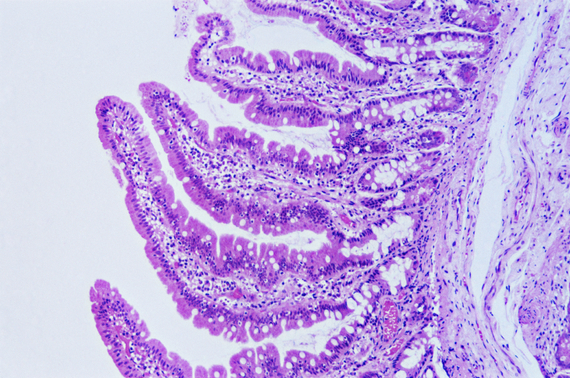Let's start from the beginning. Ever wonder how this whole recent gluten thing started?
Cholera and a rock star, of course... well, a scientific rock star, that is. Yes, there are rock stars even in the scientific community and this post will walk you through some fantastic research by the biggest "gluten" rock star -- Alessio Fasano, M.D. There is a lot of fiction out there about gluten but here are the scientific facts that launched a multi-billion dollar gluten-free industry... and help many with autism...
So how did this gluten thing really start?
In the 1980s, Dr. Fasano was developing a cholera vaccine. The cholera bacteria produce a toxin that causes massive amounts of diarrhea and therefore a vaccine could be used therapeutically to save lives from this deadly disease. The research went well in animal models so a clinical trial with healthy humans was the next step. Unfortunately, the vaccine did not work completely and the human subjects still had diarrhea when given the vaccine and cholera although the diarrhea was much less. This was a huge scientific disappointment and most would also say a failure.
But this is how a rock star is born.
Dr. Fasano could have easily given up and moved on to some other research project but instead Dr. Fasano set out to find out why his vaccine did not work. This is called resilience! In that act Dr. Fasano became a scientist rock star... he learned from his failure, actually thrived from his failure, and now has a much larger impact in society than he could have ever imagined. Let me explain what he found...
Tight junctions... not quite a "sealed gut"... big difference
Through gene mutation studies and some beautiful science Dr. Fasano and his team were able to identify a second toxin that cholera produced. This second toxin causes mild diarrhea by increasing the permeability of the small intestinal mucosa. Now this was a surprise back then because most people thought the gut was more like a "sealed tube." Other researchers started dispelling the "sealed tube" theory and discovered that the gut has a series of complex molecular interactions that keep the gut held together which is more like "tight junctions." This is what keeps the gut from letting the wrong things into the body... the small intestine is actually a tube of cells, one cell layer thick, that is held together by a small amount of molecular interactions. Remember playing the game Red Rover on the playground? There was always a kid who would let their hand go... losing "tight junctions" in your gut is kind of like that... scientifically, these interactions are called zonula occludens (Zo). This second toxin from cholera was duly named zonula occludens toxin (ZOT).
What else does ZOT do?
ZOT increases secretions of water and chloride in the small intestine, hence the pleasant experience of diarrhea. Thankfully ZOT does not affect colon permeability; it only targets the small intestine (the small intestine is where most of nutrient absorption occurs so that is a tad bit of a problem). But it is not all bad news... ZOT is time- and dose-dependent plus the whole process is reversible!
What diseases are known to have problems in the small intestine?
Ohh only 50 million Americans have diseases that are known to have problems in the small intestine, such as celiac disease, Type 1 diabetes, Crohn's disease, Rheumatoid Arthritis, Ankylosing Sponditis, Irritable Bowel Syndrome. That's not counting the people dealing with brain cancers, breast cancer, lung adenocarcinoma, ovarian cancer, and pancreatic cancer, all of which the zonulin biomarker is also associated. Oh, and also multiple sclerosis and schizophrenia. Many more are currently being researched... such as autism. And what do many of these people do to feel better? Avoid gluten! Hmmmmm...
So how does gluten fit into all this?
Gluten actually causes increased intestinal permeability by inducing a compound called zonulin to be released. Zonulin causes tight junctions to not be so tight... thus increased intestinal permeability. Sound familiar? The large gluten molecule is able to molecularly interact with our body and cause our body to increase zonulin production...zonulin then causes increased permeability... and then this large gluten molecule is able to get into our body's circulation. The gluten molecule is too large to normally enter our body therefore when it does gain access to our body through our small intestine, our immune system perceives it as a threat and for some people it starts the cascade of a chronic disease. And here is some mind blowing science... zonulin controls cellular interactions throughout the body... not just the gut... Are you thinking what I'm thinking? Yep, zonulin also influences the blood-brain barrier. For real.
Should everyone be gluten-free?
Gluten's mechanism of action is the same for every person. If your immune system is operating properly and you eat gluten, the gluten will cause an increase in zonulin, your gut will become permeable, gluten will cross your gut barrier, and your immune system will handle the "invader" (gluten) ideally before wreaking any havoc. In a short amount of time, your zonulin production will decrease, your gut will reestablish the proper tight junctions, and you have no worries. However in certain people lots of zonulin will be produced therefore making the gut much more permeable and for a much longer time... other things like bacteria and viruses can enter as well. Additionally, if your immune system is overactive it will attack the gluten molecules but also attack your own body too. So no, not everyone needs to be gluten free... but if you have a chronic disease or unexplained symptoms, it is really important to understand that the food you eat does change how your body functions. To quote Benjamin Franklin: "Tell me and I forget. Teach me and I remember. Involve me and I learn." Don't believe this gluten stuff? Go experiment.

